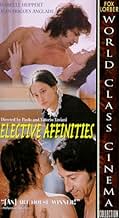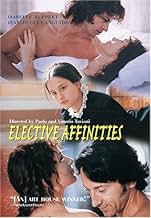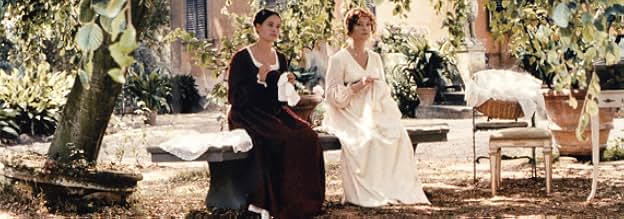'Eeny, meeny, miny, moe is a children's counting rhyme, used to select "it" for games and similar purposes.' Writers/Directors Paolo and Vittorio Taviani have reduced Johann Wolfgang Goethe novel "Die Wahlverwandtschaften" into a somewhat stilted, pseudo-intellectual game and renamed it "Le affinità elettive" (or Elective Affinities). The result if a stodgy and at times only semi-interesting twist on love affairs gone awry.
In the 18th century Countess Carlotta (Isabelle Hupert) encounters her love of 20 years ago, one Baron Eduardo (Jean-Hugues Anglade). They reform their affinity and marry. One year later we find them happily at home in the Baron's Tuscan villa, a home the Baron adores for its geometric beauty (science) and Carlotta loves for its artistic aura (art). Eduardo wants to complete the buildings on their vast land holdings in Tuscany and convinces Carlotta to allow him to invite a famous architect Ottone (Fabrizio Bentivoglio), long a cherished childhood friend, to move in with them to complete the architectural possibilities the site offers. Carlotta has premonitions of bad omens and decides to invite her somewhat neurotic, asocial goddaughter Ottilia (Marie Gillain) to move in with the growing household and to be company to Ottone. After endless talking sprees there develops an affinity between Carlotta and Ottone and an equally strong one between Eduardo and Ottilia. Clandestine encounters become public when Carlotta discovers she is pregnant, the baby is born, looking very much like Ottone!, and a tragedy occurs when Ottilia is caring for the baby: the baby drowns. Ottilia return to her neurotic shell of isolation, the affairs are discovered and tragedies continue. There really is no ending to the story: it just stops.
For those of us who admire the consistently fine work by actress Isabelle Huppert this film is a draw. But sadly even the gifted Huppert (with her French spoken lines, along with the other two French actors, annoyingly dubbed into Italian) is unable to make us care for anything or anyone in this experiment of love. But perhaps that is more the fault of Goethe: 'Die Wahlverwandtschaften (also translated under the title Kindred by Choice) is the third novel by Johann Wolfgang von Goethe, published in 1809. The title is taken from a scientific term once used to describe the tendency of chemical species to combine with certain substances or species in preference to others. The novel is based on the metaphor of human passions being governed or regulated by the laws of chemical affinity, and examines whether or not the science and laws of chemistry undermine or uphold the institution of marriage, as well as other human social relations.' Like the metaphor on which this film is based this is a laboratory experiment rather than a dissection of love gone awry.
Grady Harp



























